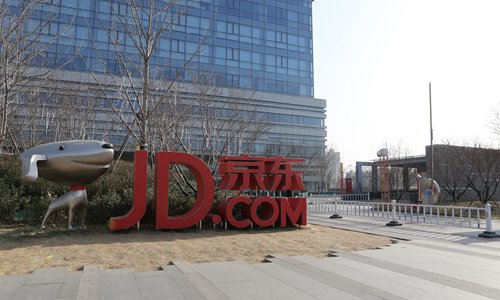
A view of JD.com Inc Photo: Chen Qingqing/GT
Domestic e-commerce company JD.com Inc (JD) aims to embed artificial intelligence (AI) in its logistics and supply chain so vendors can use its big data to make better decisions, a company executive said on Thursday.
JD established the Y business unit, an arm for its logistics services, in November 2016 with the goal of building smart supply chains, Zhai Xinlei, head of the supply chain and planning and development department of JD's Y business unit, told the Global Times on Thursday.
"Our major advantages are massive data and application scenarios," he said.
The NASDAQ-listed company has an ambitious plan to use AI in such areas as unmanned warehouses, autonomous drones and delivery robots.
CEO Liu Qiangdong said during Tech World in July 2017 that the essential nature of retail will not change, since it is about user experience, cost and efficiency. But AI will add value in those areas, he was quoted as saying in media reports.
"Based on algorithms, vendors on our platforms will know better what products to target and how to manage their inventories," Zhai said. The data could include shopping behavior, user profiles and inventory status.
AI will enable supply chains to be dynamic and self-adapting to a constantly changing environment, much like the human brain, industry consultancy Gartner analyst Mike Burkett said in an article published on the firm's website in May 2017.
In the future, supply chains will be able to digest massive amounts of data, anticipate customer needs, predict when critical suppliers will shut down, and autonomously and dynamically reconfigure the network to respond, the analyst wrote.
In addition to using big data and AI in logistics, the Y unit is focusing more on advanced technologies like blockchain, which can be used in ensuring product traceability and authenticity, Zhai said.
Other major e-commerce companies are also building smart supply chains. For instance, US-based Amazon has been testing an invitation-only warehouse and shipping program to tackle warehouse congestion, CNBC reported on Monday.
Some foreign companies can now apply real-time big data analysis in the retail sector, Zhai remarked.
"In overseas markets, it has become a mature process to conduct this process based on big data and other technologies," he said, adding that many Chinese companies have not yet tapped into this area.


